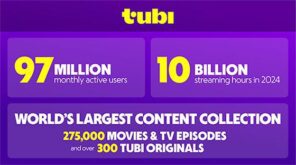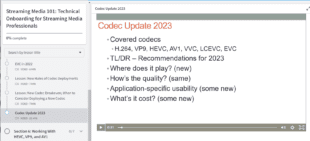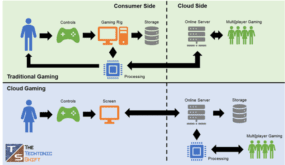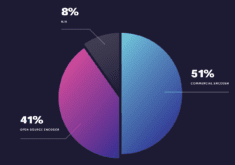This post will quickly summarize the current status of HEVC royalties. There are two existing patent pools. The first was assembled by MPEG LA and calls for royalties of $0.20/unit on encoders and decoders, after a 100,000 de minimus exception, with a US $25 million annual cap, and no royalty on encoded content. Here’s a screen grab from a presentation on the MPEG LA website you can download by clicking the slide.
Here’s an article where I discuss and explain the MPEG LA Royalties.
Reaction to the MPEG LA pool was rather bland. No one likes paying royalties, but the royalties have generally been considered reasonable and were accepted without any major protest.
Enter HEVC Advance
The second pool is from HEVC Advance, which is backed by GE, and includes HEVC IP owners Technicolor, Dolby, Philips, and Mitsubishi Electric, and most recently MediaTek. HEVC Advance royalties range from $.80/unit to $1.50/unit for encoder/decoders, depending upon the playback device, with no deminimus exception, and no cap, plus a .5% content royalty on revenue attributable to HEVC. HEVC Advance has their own chart, shown below.
Reaction to the HEVC Advance royalty structure ranged far and wide (Huffington Post? USA Today?) and has been highly critical, and for good reason. For example, I checked today (October 16), and the HEVC Advance website still doesn’t list the essential patents that it represents. So they want some companies to pay hundreds of millions of dollars without knowing exactly which IP rights they get in return. Imagine explaining that to your CFO.
The hardware royalties are so much higher than those proposed by MPEG LA, and in place for H.264, that they will almost certainly give rise to a FRAND challenge for not being fair and reasonable as required for IP that contributes to a standard. While the content royalties seemed reasonable to me, many companies and many analysts felt strongly otherwise. In late September, HEVC Advance capitulated and stated that they were going to “adjust the fees” but didn’t release any details.
I review and explore the HEVC Advance royalty structure in HEVC Advance: What Do the Royaties Mean for Video Publishers. I focus on the content royalty in HEVC Advance Royalties: Onerous or Not?
The potential for a third HEVC licensing group has been discussed by several industry analysts, most notably Dan Rayburn, who stated that the third group is already forming. So while in January, 2014, we thought that the HEVC royalty structure was buttoned down, here at the end of 2015, there are still very significant unknowns, both known, and unknown (for you Dick Cheney fans out there).
Other Alternatives
While I wanted this article to focus solely on HEVC, I would be remiss if I didn’t mention that several alternatives were brewing. Most significant is the Alliance Codec, produced by a new consortium of companies called the Alliance for Open Media, which contains a couple of names you might recognize, like Intel, Microsoft, Cisco, Mozilla, Google, Netflix, and Amazon. All have contributed IP to the group, and all have pledged that any fruits of the group will be royalty free. Other new and interesting projects including include the Perseus codec from V-Nova, and the newly announced from Tveon codec.
While it once seemed that the codec world would transition from H.264 to HEVC quietly and seamlessly, that no longer seems to be the case. It’s going to be interesting to see how all this develops in 2016 and beyond.
 Streaming Learning Center Where Streaming Professionals Learn to Excel
Streaming Learning Center Where Streaming Professionals Learn to Excel









